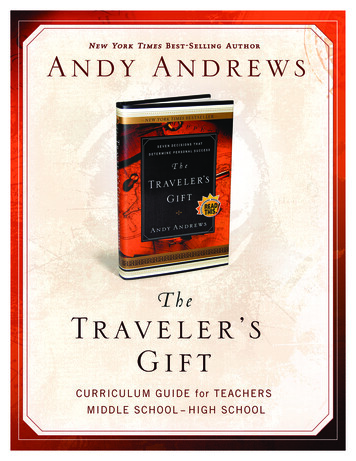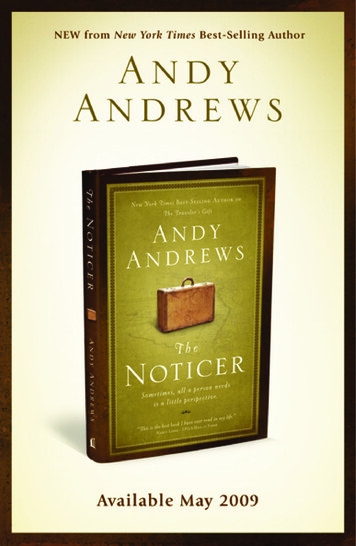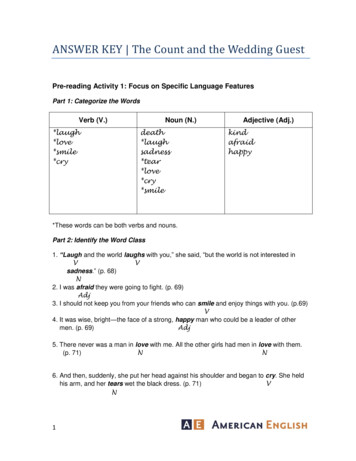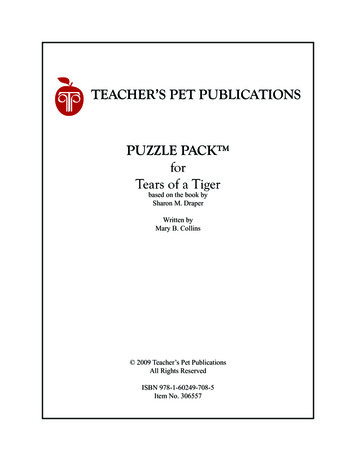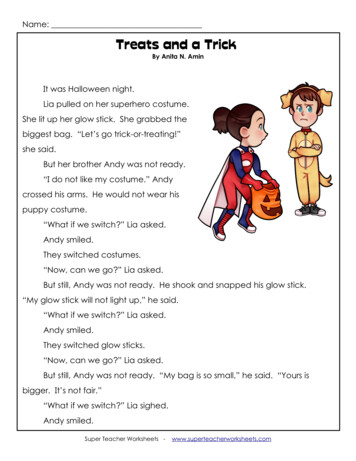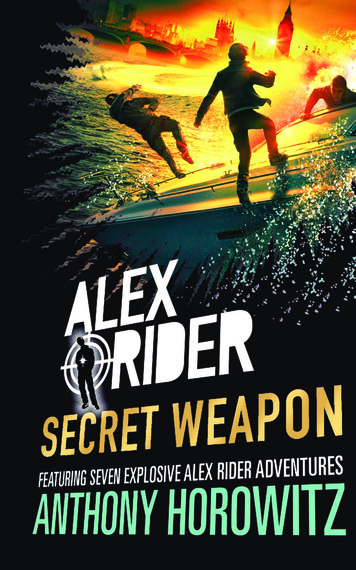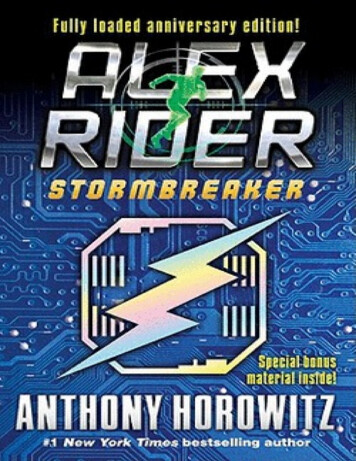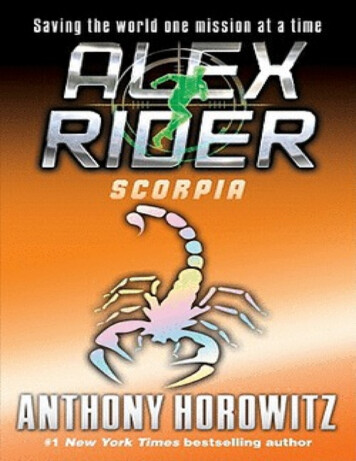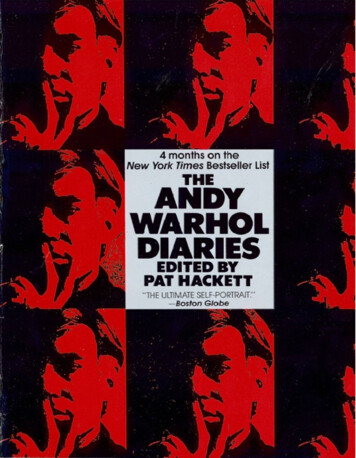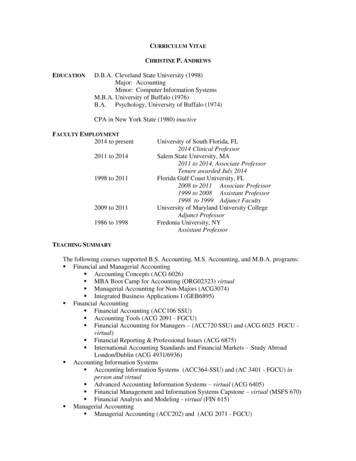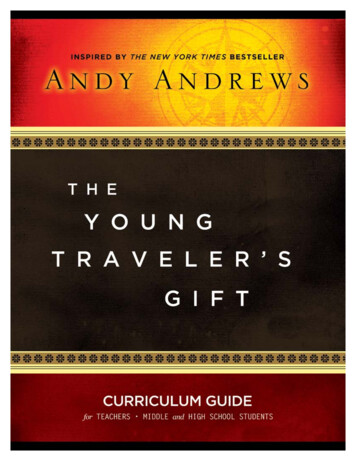
Transcription
Th eYoungTraveler’sGiftSE V E N D E C I S I O N S T HAT DETERMINE PERSONAL SUCCESSbyAndy AndrewsA Curriculum Guide for TeachersMiddle School — High SchoolIncluding Student Reproducible PagesWritten byPeggy Hoekenga, MEdEdited byWill Hoekenga, SixWordsStudio.comLayout and Design byKevin Burr, OcularInk.comLightning Crown Publishers, Inc.P.O. Box 17321 Nashville, TN 372171-800-726-2639www.AndyAndrews.com 2011 Lightning Crown Publishers, Inc.All content owned by Lightning Crown Publishers, Inc. All rights reserved.Portions of the work may be reproduced and distributed for educational purposes only.
About the Curriculum Guide AuthorTheYoung Traveler’s GiftAbout the Curriculum Guide AuthorPeggy Hoekenga is an assistant professor at the University of North Alabama, where she taught first grade atKilby Laboratory School for seven years and is currently beginning her fifth year as the Alabama Reading Initiative reading coach for grades K-6. She received her Master’s Degree in Early Childhood Education from theUniversity of Mississippi. In 2008, the Northwest Alabama Reading Council selected her as Reading Teacher ofthe Year. She currently lives in Florence, AL, with her husband of 34 years, Paul.Andy AndrewsPage 3
Table of ContentsTheYoung Traveler’s GiftTable of ContentsSummary.p. 5About the Author.p. 6Before Reading Activities.p. 7Build Background Knowledge.p. 7Set Purpose for Reading.p. 8Graphic Organizers for Pre-Reading Activities.p. 9-13Introduce Vocabulary.p. 14-23Vocabulary and Word Study Activities.p. 17-28During Reading.p. 29Questions for Discussion and Comprehension.p. 29-36After Reading Activities.p. 37Enrichment/Extend the Learning.p. 37-45Vocabulary Quiz.p. 45-49Book Test.p. 50-54Quiz and Test Answer Keys.p. 55-56Andy AndrewsPage 4
SummaryTheYoung Traveler’s GiftSummaryMichael Holder began his journey as the last young traveler to receive the unique gifts of wisdom offered by historical greats.In his senior year of high school, Michael hit rock bottom. After being caught in the wrong place at the wrong time,he was suspended from the track team and lost his college scholarship. His coach was angry and his parents disappointed. He was diving headfirst into a downward spiral. Facing the bleak future ahead, he saw no way out andwondered if life was really worth living. But now, with some divine intervention, he’s been given a second chanceand offered a once-in-a-lifetime journey of discovery.Rewritten to engage the minds of teens and tweens, The Young Traveler’s Gift is sure to encourage and enlightenyoung men and women as they prepare to face the journeys that lie ahead.Andy AndrewsPage 5
About the AuthorTheYoung Traveler’s GiftAbout the AuthorHailed by a New York Times writer as “someone who has quietly become one of the most influential people inAmerica,” ANDY ANDREWS is the author of the New York Times bestsellers The Noticer and The Traveler’sGift, and is also an in-demand speaker for the world’s largest organizations. The Noticer and The Traveler’s Giftwere featured selections of ABC’s Good Morning America, have been translated into nearly 20 languages, andcontinue to appear on bestseller lists around the world.Andy has spoken at the request of four different United States presidents and toured military bases around theworld, being called upon by the Department of Defense to speak about the principles contained in his books. Arguably, there is no single person on the planet better at weaving subtle yet life-changing lessons into riveting talesof adventure and intrigue—both on paper and on stage.He lives in Orange Beach, Alabama, with his wife, Polly, and their two sons.Andy AndrewsPage 6
Before Reading ActivitiesTheYoung Traveler’s GiftBefore Reading ActivitiesBuild Background KnowledgeSelect one of the following activities to build background knowledge: Have students participate in a “quick write.” They will write down the person from history whom they would1most like to talk to and then they will write down as many questions to ask their famous person as possible.Students must write as quickly as they can, because they will only have two minutes in which to write. Who would they choose to visit? Why did they select this person? What questions will they ask this person? List three guidelines for successful living or “rules to live by” that they think this personwould tell them. Give students a time limit (maybe 10-15 minutes) to compose their thoughts. Then, have the studentsmeet with a partner or in a small group. Each person will give the person who is sharing feedback usingthe 3-2-1 graphic organizer on page 9. Ask students the following question: If you could speak to one famous person from the past, whom would2you choose? Give students 1-2 minutes of think time before they can speak and share any answersaloud. Then, have students share the names of the people they would choose. Teacher will list thesenames on the board. Next, divide students into small groups to narrow down the list on the board. Theyshould, as a group, pick one person they would choose and list three questions they would ask this person. They must also explain why they would choose this person, what they can learn from this person,and why they would ask them these particular questions.Andy AndrewsPage 7
Before Reading ActivitiesTheYoung Traveler’s GiftSet Purpose for ReadingChoose one of the following to set the purpose for reading: 1 Tell students that they will be reading a book about a boy who learns several valuable life lessons fromfamous historical figures. Ask them to make a list of each lesson as they read about them using the graphicorganizer on p. 10 and 11. 2 Fill a small suitcase with the following items: a copy of the Gettysburg address a notecard with “The Buck Stops Here” written on it a diary a picture of a Union Soldier a Bible a pink rose a crown a Star of David a world map a copy of the Presidential Seal a small globe Have students list these items on their graphic organizer. Then, as they read the story, they shouldfigure out with whom these items are associated. Some items might be readily identified with morethan one character and some characters may be identified with more than one item. As they list theitems, explain why they’ve chosen the item(s) to go with each character. They may use the graphicorganizer on p. 12-13, and it may be copied front and back on one sheet of paper. 3 Show students the front of the book and read the title to them. Ask students to make predictions aboutthe traveler’s identity and what the traveler’s gift might be. They may also predict where they think thetraveler might be going and what he/she will do when they get there.Andy AndrewsPage 8
Before Reading ActivitiesTheYoung Traveler’s GiftGraphic Organizers for Before Reading Activities3-2-1List 3 things you like or thought were interesting about the person your classmate chose and the questions they would ask them:List 2 suggestions that you have for your classmate about what they said:List 1 question that you have for your classmate:Andy AndrewsPage 9
Before Reading ActivitiesTheYoung Traveler’s GiftGraphic Organizers for Before Reading ActivitiesSeven Life Lessons Learned from Heroes of the PastDirections: Complete the Graphic Organizer as you read about each famous person that David Ponder encountered in his travels. Include the place and time period for the meeting (i.e. 1863, Gettysburg, PA). Then,in your own words, give a brief summary of the lesson that David learned.1st Hero:Time Period and Location in History:Life Lesson Learned:2nd Hero:Time Period and Location in History:Life Lesson Learned:3rd Hero:Time Period and Location in History:Life Lesson Learned:Andy AndrewsPage 10
Before Reading ActivitiesTheYoung Traveler’s Gift4th Hero:Time Period and Location in History:Life Lesson Learned:5th Hero:Time Period and Location in History:Life Lesson Learned:6th Hero:Time Period and Location in History:Life Lesson Learned:7th Hero:Time Period and Location in History:Life Lesson Learned:Andy AndrewsPage 11
Before Reading ActivitiesTheYoung Traveler’s GiftWhat’s in the Traveler’s Suitcase?Directions: In the box below, list the items that were found in your teacher’s suitcase. As you read, list thecharacter that the item(s) signify. Some items may be suitable for more than one character. Briefly explainwhy the item(s) might represent that particular character.Contents of Suitcase:1. Character:Item(s):What is the significance of the item(s) to that person?2. Character:Item(s):What is the significance of the item(s) to that person?3. Character:Item(s):What is the significance of the item(s) to that person?Andy AndrewsPage 12
Before Reading ActivitiesTheYoung Traveler’s Gift4. Character:Item(s):What is the significance of the item(s) to that person?5. Character:Item(s):What is the significance of the item(s) to that person?6. Character:Item(s):What is the significance of the item(s) to that person?7. Character:Item(s):What is the significance of the item(s) to that person?Andy AndrewsPage 13
Before Reading ActivitiesTheYoung Traveler’s GiftIntroduce VocabularyThe vocabulary should be introduced prior to reading. The words are listed by chapters. Determine howmany chapters you will assign to your students and then introduce the corresponding vocabulary prior to theirreading. You may choose all the words in each section, or select the ones that best suit the ages, needs, andknowledge-base of your students. When choosing vocabulary words, look for high utility words that studentswill use frequently in their oral vocabulary and writing. While students may not know the definitions of somewords, that doesn’t mean they are high utility vocabulary words.Vocabulary activities and graphic organizers are on the pages following the vocabulary lists.Chapters 1 & 2excruciating (p. 1)terse (p. 1)endangerment (p. 2, 16)liability (p. 7)optimistic (p. 8)designated (p. 9)delinquent (p. 11)trauma (p. 12)pending (p. 16)embankment (p. 18)Chapter 3contrasted (p. 19)vague (p. 24)apostle (p. 25)enunciated (p. 24)ample (p. 26)Chapter 4stunned (p. 37)murmured (p. 40)despair (p. 41)fluently (p. 43)astonishment (p. 43)disarray (p. 46)tolerate (p. 47)bombard (p. 50)Andy AndrewsPage 14
Before Reading ActivitiesTheYoung Traveler’s GiftChapter 5gruesome (p. 54)civil (p. 55, 56)prompted (p. 58)forfeited (p. 59)tactics (p. 61)retreat (p. 62)indecisive (p. 69)idle (p. 69)Chapter 6stout (p. 74)convictions (p. 77)consensus (p. 78)tentative (p. 82)passionate (p. 82)procrastinate (p. 83)Chapter 7muffled (p. 85)annex (p. 88)meager (p. 93)shrugged (p. 91)unattainable (p. 98)censored (p. 91)potent (p. 99)Chapter 8contemplating (p. 103)stammer (p. 105)pursued (p. 107)bestow (p. 122)hoarded (p. 122)assurance (p. 122)seethed (p. 122)nurture (p. 122)Andy AndrewsPage 15
Before Reading ActivitiesTheYoung Traveler’s GiftChapter 9renders (p. 130)circumstances (p. 131)dispensation (p. 132)regenerate (p. 133)calamity (p. 136)dissolution (p. 137)arrogance (p. 139)persist (p. 142)precursor (p. 142)Chapters 10 & 11literary (p. 146)Andy Andrewsinaudible (p. 151)concussion (p. 152)regal (p. 155)Page 16
Before Reading ActivitiesTheVocabulary ActivitiesYoung Traveler’s GiftFor Grades 6-81 Have students define the vocabulary words that you select using the graphic organizers on pages 19, 20, 21, or 22. 2 Assign each student one of the vocabulary words. Give them a 4 x 6 note card. They will write the wordon the back of the card. Have them fold the card in fourths. Then, in each square, they will write one ofthe following: a definition, synonym, antonym, and an illustration for the word. Instead of antonym andsynonym, you might ask them to provide some examples and non-examples. Students will then swaptheir cards with a partner and try to guess the word. The cards are self-checking, so they could also becollected and placed in a center.3 Students could make semantic maps for some of the more difficult words. In the middle of their paper,they will draw a circle and write the vocabulary word in the circle. Extend lines out from the circle and,at the end of each line, write any words that are related to the word. (Students can design their ownmap or organizer.) 4 Have one student sit with his or her back to the board. The teacher will write a vocabulary word on theboard, and the other students will give clues, one at a time, until the student with his or her back to the boardguesses the word correctly. The clues can be: antonyms, synonyms, part of speech, definition, etc 5 Use the Word Sort graphic organizer on page 23 so that students can identify the parts of speech for the vocabulary words that you select. You may want to include the page numbers where the words are foundif you use words from multiple chapters. 6 Some students continue to become confused when asked to spell words with inflectional endings. If youhave students who are having trouble with this skill, have them sort the vocabulary words and other wordsfrom the book with inflectional endings using the sorting activity on page 25.Andy AndrewsPage 17
Before Reading ActivitiesTheYoung Traveler’s Gift 7 Have students write the vocabulary words that have prefixes and/or suffixes. Then, have them write thebase word for each of these words. Next, they will write as many other forms of the word as possible byadding different prefixes and/or suffixes. They can use their own paper, or the grid on page 27. You maywant to provide the students with a prefix and suffix word bank. If so, there is one on the page following thegraphic organizer, but, unless absolutely necessary, don’t limit them to the word banks. 8 Have students write a short story or a poem using all the vocabulary words from one or two chapters.9 Have students go to the following website: www.makebeliefscomix.com and select a characterfor each vocabulary word and a speech bubble. Then, have them write a sentence in each speechbubble using a vocabulary word. When they are finished, they must print their work, as this site will notsave the students’ comics.Andy AndrewsPage 18
Before Reading Illustrate:Illustrate:Use in a sentence:Use in a strate:Illustrate:Use in a sentence:Use in a sentence:Andy AndrewsYoung Traveler’s GiftSynonyms:Synonyms:Page 19
Before Reading ActivitiesTheYoung Traveler’s GiftNameVocabulary WordsWord:Short Definition (in your own words):SynonymsAntonyms1.1.2.2.Visual representation of the word. How would you illustrate this word?Use the word in a sentence.Andy AndrewsPage 20
Before Reading ActivitiesTheYoung Traveler’s GiftVocabulary Word Definitions Using context cluesWord:Page # found in text:Sentence used from text:Your definition based on context clues:Word:Page # found in text:Sentence used from text:Your definition based on context clues:Word:Page # found in text:Sentence used from text:Your definition based on context clues:Andy AndrewsPage 21
Before Reading ActivitiesTheYoung Traveler’s GiftVocabulary Word Graphic OrganizerWord:Definition:Synonym: Antonym:Source of definition:Word:Definition:Synonym: Antonym:Source of definition:Word:Definition:Synonym: Antonym:Source of definition:Word:Definition:Synonym: Antonym:Source of definition:Andy AndrewsPage 22
Before Reading ActivitiesTheYoung Traveler’s GiftNameVocabulary Word SortParts of SpeechNounVerbAdjectiveAdverbMore than One****Find the words that can be used as multiple parts of speech. Then, locate the word in the text and indicate which part of speech itis used as in the book.WordAndy AndrewsPage Number in BookPart of speech as used in textPage 23
Before Reading ActivitiesTheYoung Traveler’s GiftNameInflectional Endings Word nghoningtransfixedvilifieddivertedagonizedA note to teachers and directions for use:Cut out the above words. Write the base word for each word in that first column of their blank grid (following page).Then, sort and glue them into the appropriate column on the blank grid. If you have students who are strugglingreaders and spellers, manipulating the words will be most helpful for them. When they finish sorting and gluingthem in the correct column, you may also want to have them follow up by making their own grid and writing thewords on another sheet of paper, exactly as they have them sorted. You may also want them to conduct a wordsearch in other reading materials for words with inflectional endings, and add them where they would belong inthe sort. For students who don’t need as much practice, or to conserve paper, teachers might choose to post thevocabulary words, and have students do a writing sort with the words and simply write them in the appropriatecolumn on their sheet. Students could even make their own grid if the teacher provides them with a model.When students have completed the sorting, ask them if there are any generalizations they can make about whento drop e, make no changes, etc This helps them form their own rules about when to make these changes andhelps them remember the rules.Andy AndrewsPage 24
Before Reading ActivitiesTheYoung Traveler’s GiftInflectional Endings Word SortBase WordAndy Andrewse dropChange y to iNo changeDoublePage 25
Before Reading ActivitiesTheYoung Traveler’s GiftVocabulary Word SortAnswer Keyfor Inflectional Word EndingsSort Vocabulary Word Graphic OrganizerBase Worde e y to iNo gcensoredcensorpursueDoublepursuedcontemplate contemplatingseethehoardnodAndy AndrewsseethedhoardednoddedPage 26
Before Reading ActivitiesTheYoung Traveler’s GiftHow Many Words Can You Create?Choose a vocabulary word that has a prefix and/or a suffix. Then, identify the base word in the word. How manynew words can you create by adding different prefixes and/or suffixes to the base word?Vocabulary WordBase WordVocabulary WordBase WordVocabulary WordBase WordVocabulary WordBase WordNew Words:New Words:New Words:New Words:Andy AndrewsPage 27
Before Reading ActivitiesTheYoung Traveler’s GiftWord BanksCommon PrefixesMeaningPrefixanti-againstdis-not, oppositein-, im-inmis-not, wronglynon-notpre-beforere-againun-notCommon SuffixesMeaningSuffix-able, -iblecan be done-enmade of-ercompare t wo things-estcompare more than t wo things-fulfull of-lylike (adverb)-mentaction of process-nesscondition of-ylike (adjective)Andy AndrewsPage 28
During Reading ActivitiesTheYoung Traveler’s GiftDuring Reading ActivitiesQuestions for Discussion and ComprehensionChapter One1. Michael had so many questions and thoughts going through his mind as the police officer called his parents.How do you think your parents would feel if they got a phone call saying that you were in jail? What do youthink they would say? How do you think they would treat you? (Answers to these questions will vary.)2. Do you think it was fair for Michael’s dad to expect Michael to get a part-time job to pay for his attorney?Why or why not? (Answers will vary.)3. Michael had not been drinking, but his friends had. He certainly couldn’t let them drive, so he became the designated driver. He hadn’t done anything wrong; he was just helping out. But now, Michael was in as much troubleas his under-age drinking friends were. What should Michael have done? Is there a better choice that he couldhave made before getting behind the wheel of that car? What would you have done? (Answers will vary.)Chapter Two1. Michael’s friends and teachers treated him badly at school the next day. Do you think they treated him fairly?How would you have treated him? Explain your answer. (Answers will vary.)2. What did the coach tell Michael? (No practice, no playing, and that if he didn’t play, he wouldn’t have anychance for a college scholarship.) Do you think this was fair? Why? (Accept any reasonable answers.)3. The sign at the restaurant said they were hiring servers. At first, the manager seemed very eager to hire Michael. Why do you think the manager suddenly became disinterested in hiring Michael? Did he have a validreason? (Answers will vary, but should include that Michael had been arrested.)Andy AndrewsPage 29
During Reading ActivitiesTheYoung Traveler’s Gift4. Michael left the restaurant feeling frustrated and hopeless. Why did he feel this way? What did he do next?(He knew the manager was never going to call him because he had been arrested and had a criminal record.He realized this would be asked on all the applications and no one would ever hire him. How would he payhis attorney and how would he pay for college? He was also discouraged because he had disappointed hisparents. He began to cry and drive way too fast. He lost control of the car and went over an embankment.)Chapter Three1. Where is Michael when he wakes up? Describe the setting in great detail. (He is sitting on an expensivelooking rug in a fancy room with high ceilings. There is a very large hand-carved desk, an un-lit fireplace,and a globe on a pedestal. It is very warm and the windows are open. He is in Potsdam, Germany, and it isTuesday, July 24, 1945.)2. Michael thinks he might be in the hospital. Do you think he is dreaming? Do you think he is alive? Explainyour answer. (Answers will vary.)3. Whom does Michael meet here? (President Harry Truman) This person tells Michael that the choices hehas made will affect him for the rest of his life. Do you believe this is true? Explain your answer and give anexample. (Accept any reasonable answers.)4. Michael is given a piece of paper by this person. What does he learn when he opens it and reads it? (Helearns the first decision for success, the buck stops here.) In your own words, explain what this means. (Answers will vary.)Chapter Four1. What happened when Michael read the final words on the note? (Everything around him began to change andshift. He felt dizzy. Suddenly he was in another place, as though he had fallen through the floor.) Where is henow? (He is in a very large, ornate room with a lot of other people.)Andy AndrewsPage 30
During Reading ActivitiesTheYoung Traveler’s Gift2. What is going on? (A gong has sounded and people are falling to their knees. The gong sounds again anda very large, richly clothed man appears. He is wearing a crown and he sits upon the throne in the room. Anargument begins to ensue.) Why are the two women here and what are they arguing about? (They are hereto get the king to settle their dispute. They are arguing over a baby. One woman says the other woman’s babydied and then she brought it to her room and swapped the dead baby for her living baby. Then, she pretendedit was her own child. The other woman says this is not true.) How does the King settle their dilemma? (Hesays he will cut the child in half and they can each have a part of him. One of the women falls to her kneesand pleads with the king not to kill him and just give him to the other woman. The other woman hatefully saysthat he can go ahead and cut him in half so that neither of them has a child. The king puts his sword down andgives the child to the woman who is weeping, as he feels she is surely the mother.)3. Does Michael recognize the king? (Yes, he knows this is King Solomon.) How does he know his identity? (Heremembers this Bible story from his childhood.)4. Do you think that your friends influence what you do and the decisions that you make? Why or why not? Givean example to support your thinking. (Answers will vary.)5. The king left Michael with the second decision for success. What was it? (I will seek wisdom.) In your ownwords, explain what it means. (Accept all reasonable answers.)Chapter Five1. At the beginning of chapter five, we learn that Michael hears the loudest noise that he has ever heard in his life.What is it? (He thinks it is thunder, but it’s actually a cannon firing.) Where is he and what is going on there?(He is in Gettysburg, PA, during the Civil War.)2. Who is Chamberlain? (Colonel Joshua Lawrence Chamberlain is an officer in the Union Army. Before this war,he was a school teacher in Maine.) Why did Chamberlain join the Army? (It was the patriotic thing to do, hewas bored, he was ashamed not to join, he thought it would be over quickly and it would be fun, but mostly hejoined because it was the right thing to do, it was his duty.)Andy AndrewsPage 31
During Reading ActivitiesTheYoung Traveler’s Gift3. C hamberlain explains to Michael what his greatest advantage is in this fight. What is it? (He says he is a stubbornman and that he has the inability to stand by and do nothing.) What does he mean by this? (Answers will vary.)4. H ere, we learn about the third decision—I am a person of action. After reading the note Chamberlain gave to Michael, how would you describe a person of action? (Answers will vary, but should include something about beingactive, energetic, and the kind of person who inspires others to follow them. They are doers, leaders, consistent,and decisive. They are courageous and encouragers. They don’t quit, etc.)Chapter Six1. W hy is Michael feeling nauseous again? (This time it’s more than just the time travel that has made him queasy;he is on a large boat, so he may be feeling a bit seasick.) Describe the setting where he finds himself now. (It isnighttime and there is the smell of salt water, reminding Michael of his summer trips to the ocean. He is sitting ona large pile of rope. The boat is moving across the Atlantic Ocean and it has a huge broadcloth sail. He is on theSanta Maria with Christopher Columbus in 1492.)2. W hy did people think Christopher Columbus was crazy? (He believed he could establish a new trade route by sailing west. He believed that the world was a sphere while others thought it was flat.) Did it bother him that peoplethought this? Why or why not? (No, it did not bother him. He explained that you can’t worry what others think; thatwould mean that you valued their opinion more than you valued your own. He said you don’t need the permissionof others to believe what you want to believe.)3. W hat does it mean to have a decided heart? (Answers will vary, but should include some of the following: Alwayssearching for a solution, not for a way out of something. You have a vision and you are passionate about pursuingthat vision. You won’t let anything get in the way as you pursue it. You don’t wait; you seize every opportunity tomove forward. Your belief is so strong and you are so committed to your belief that others will want to follow you.You are not a procrastinator.)Andy AndrewsPage 32
During Reading ActivitiesTheYoung Traveler’s GiftChapter Seven1. Next, Michael finds himself in a small room with seven people. Why aren’t the people moving and talking?Explain what is going on at this very moment. (They are still and quiet because they are hiding. At this verymoment, the home in which they are hiding is being searched by German soldiers. If they are found, they willbe killed or taken to the concentration camps, and those who are hiding them will be punished.)2. Soon, a young girl takes Michael upstairs to the attic. Who is this girl, where are they, and what is the date?(Anne Frank—they are in Amsterdam in the annex behind a warehouse. It is Thursday, October 28, 1943.)3. Michael is surprised by Anne’s response when he asks her what she complains about. In your own words, explain her response. (Answers will vary, but should sound something like the following: Anne says she does notcomplain about anything. She says complaining is an activity, just like other activities, such as jumping rope.You can choose to do that activity or choose not to do it. So, she chooses NOT to complain.) Do you agreewith her view on making choices? Why? (Accept any reasonable explanation.)4. What is the fourth decision for success? (Today, I will choose to be happy.) Re-read pages 98 and 99 andthen explain how it is possible to be happy even when things aren’t going well for you. (Answers will vary.)Chapter Eight1. Michael returns to a place that he’s visited in an earlier chapter, but this time the setting is very different.Where is he? (He has returned to Gettysburg, P
The Young Traveler’s Gift Andy Andrews Page 6 About the Author Hailed by a New York Times writer as “someone who has quietly become one of the most influential people in America,” ANDY ANDREWS is the author of the New York Times bestsellers The Noticer and The Traveler’s Gift, and is also an
